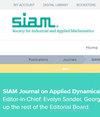On the Convergence of Nonlinear Averaging Dynamics with Three-Body Interactions on Hypergraphs
IF 1.8
4区 数学
Q2 MATHEMATICS, APPLIED
引用次数: 0
Abstract
SIAM Journal on Applied Dynamical Systems, Volume 23, Issue 3, Page 2364-2406, September 2024.Abstract.Complex networked systems in fields such as physics, biology, and social sciences often involve interactions that extend beyond simple pairwise ones. Hypergraphs serve as powerful modeling tools for describing and analyzing the intricate behaviors of systems with multibody interactions. Herein, we investigate discrete-time dynamics with three-body interactions, described by an underlying 3-uniform hypergraph, where vertices update their states through a nonlinearly weighted average depending on their neighboring pairs’ states. These dynamics capture reinforcing group effects, such as peer pressure, and exhibit higher-order dynamical effects resulting from a complex interplay between initial states, hypergraph topology, and nonlinearity of the update. Differently from linear averaging dynamics on graphs with two-body interactions, this model does not converge to the average of the initial states but rather induces a shift. By assuming random initial states and by making some regularity and density assumptions on the hypergraph, we prove that the dynamics converge to a multiplicatively shifted average of the initial states, with high probability. We further characterize the shift as a function of two parameters describing the initial state and interaction strength, as well as the convergence time as a function of the hypergraph structure.
论超图上具有三体相互作用的非线性平均动力学的收敛性
SIAM 应用动力系统期刊》,第 23 卷第 3 期,第 2364-2406 页,2024 年 9 月。 摘要.物理学、生物学和社会科学等领域的复杂网络系统往往涉及超越简单配对的相互作用。超图是描述和分析多体相互作用系统复杂行为的强大建模工具。在这里,我们研究了三体相互作用的离散时间动力学,该动力学由底层的三均匀超图描述,其中顶点通过非线性加权平均来更新它们的状态,这取决于它们相邻两对的状态。这些动力学捕捉到了强化的群体效应(如同伴压力),并展示了初始状态、超图拓扑和更新的非线性之间复杂的相互作用所产生的高阶动力学效应。与具有双体相互作用的图上的线性平均动力学不同,该模型不会收敛到初始状态的平均值,而是会引起偏移。通过假设随机初始状态,并对超图进行一些规则性和密度假设,我们证明了该动力学以很高的概率收敛到初始状态的乘法移动平均值。我们进一步描述了作为描述初始状态和相互作用强度的两个参数的函数的移动特征,以及作为超图结构的函数的收敛时间。
本文章由计算机程序翻译,如有差异,请以英文原文为准。
求助全文
约1分钟内获得全文
求助全文
来源期刊

SIAM Journal on Applied Dynamical Systems
物理-物理:数学物理
CiteScore
3.60
自引率
4.80%
发文量
74
审稿时长
6 months
期刊介绍:
SIAM Journal on Applied Dynamical Systems (SIADS) publishes research articles on the mathematical analysis and modeling of dynamical systems and its application to the physical, engineering, life, and social sciences. SIADS is published in electronic format only.
 求助内容:
求助内容: 应助结果提醒方式:
应助结果提醒方式:


